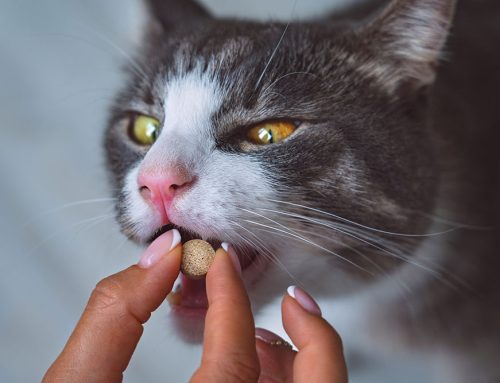Does your senior pet seem more anxious than usual or appear lost in familiar surroundings? These signs may indicate cognitive dysfunction syndrome (CDS). As your pet ages, CDS affects their organ systems, including their brain. Our Alisos Animal Hospital team knows how much you care about your aging pet, so we are providing information about CDS to help you determine if your four-legged friend is affected.
How does cognitive dysfunction affect pets?
The brain consumes about 20% of the body’s total oxygen, and cellular metabolic processes release reactive free radicals that can lead to oxidative damage to brain tissue. Normally, sufficient antioxidant amounts are produced to counteract these potentially toxic free radicals, but these protective mechanisms start to fail as your pet ages. Abnormalities observed in pets with CDS include:
- Reduced brain size — As pets age, their overall brain mass decreases.
- Reduced or dysfunctional neurons — Neurons are cells that carry information throughout the brain and body, and the brain’s ability to remember, process data, and relay information is impaired when they don’t function properly.
- Beta amyloid plaques — These plaques are protein deposits that are toxic to the brain.
- Reduced neurotransmitter activity — Neurotransmitters, such as norepinephrine, serotonin, and dopamine, are depleted.
How prevalent is cognitive dysfunction in pets?
CDS is believed to be underdiagnosed, because many owners attribute their pet’s behavioral changes to normal aging, but studies show that the condition is extremely prevalent. CDS affects about 28% of 11- to 12-year-old dogs, and about 68% of 15- to 16-year-old dogs. In cats, the condition affects about 36% between the ages of 11 to 21. Advancing age increases the likelihood of behavioral changes associated with CDS.
What are pet cognitive dysfunction signs?
The acronym “DISHAAL” is used to describe CDS signs in pets. Signs you may recognize include:
- Disorientation — Behavior may include:
- Appearing lost or confused in familiar environments
- Getting stuck in corners or behind furniture
- Staring at walls or into space
- Abnormal interactions — Signs you may notice include:
- Decreased responsiveness to family members
- Decreased affection or interaction with other pets in your home
- Increased irritability or aggression
- Sleep cycle disturbances — Behavior may include:
- Sleeping more overall
- Sleeping less at night
- Abnormal night time behaviors, such as vocalization and restlessness
- House soiling — Signs may include:
- Elimination in random indoor locations
- Elimination in sleeping areas
- Failure to signal to go outside
- Activity changes — Behavior may include:
- Decreased activity
- Decreased interest in food
- Repetitive behaviors
- Anxiety — Signs may include:
- Increased anxiety when left alone
- Destructive behavior when left alone
- Increased anxiety around other people and pets
- Learning and memory changes — Behavior may include:
- Decreased ability to recognize familiar people or pets
- Difficulty performing previously learned tasks
- Failure to respond to verbal cues
How is pet cognitive dysfunction diagnosed?
A test for CDS does not exist. Diagnosis involves observing indicative clinical signs and ruling out other issues that could cause the changes. Diagnostics typically include:
- History — Our veterinary team will ask for a detailed history about your pet’s behavior and actions.
- Physical examination — We will perform a thorough physical examination, including a neurologic exam, to detect abnormalities that may explain the changes.
- Blood work — Our veterinary team will perform a complete blood count and biochemistry profile to assess your pet’s overall health.
- Urinalysis — We may also evaluate your pet’s urine, which can reveal a lot about your pet’s health status.
How is pet cognitive dysfunction treated?

CDS cannot be cured, but when detected early, management techniques can help slow the progression. Effective CDS management typically involves:
- Environmental management — Suggested modifications to your pet’s environment include placing litter boxes in additional locations throughout your home, providing your dog with more opportunities to go outside, increasing daytime exercise to help prevent night time disturbances, and maintaining a regular schedule to reduce anxiety.
- Nutritional intervention — Our veterinary team may prescribe a specific therapeutic diet formulated for CDS pets. These diets contain ingredients, such as antioxidants, fats, and fatty acids, that may protect and promote healthy brain cells.
- Supplements — We may recommend supplements rich in antioxidants and medium chain triglycerides that can help protect and energize your pet’s brain.
- Drugs — Certain pharmacological agents are available that may help neuron function, protect the brain from further damage, and increase brain blood flow.
- Cognitive enrichment — Regular mental stimulation, including mental exercises, social interactions, and providing new toys, is important to help maintain cognitive function.
- Anti-anxiety medications — For pets who experience anxiety related issues, anti-anxiety medications or supplements may be recommended to help reduce their stress.
Scheduling biannual senior pet wellness examinations is helpful to detect health conditions, such as CDS, in the early stages, when they are easier to manage. If you are concerned about your pet’s behavior, contact our Alisos Animal Hospital team, so we can determine if CDS is contributing to their problem and devise an appropriate treatment strategy.








Leave A Comment